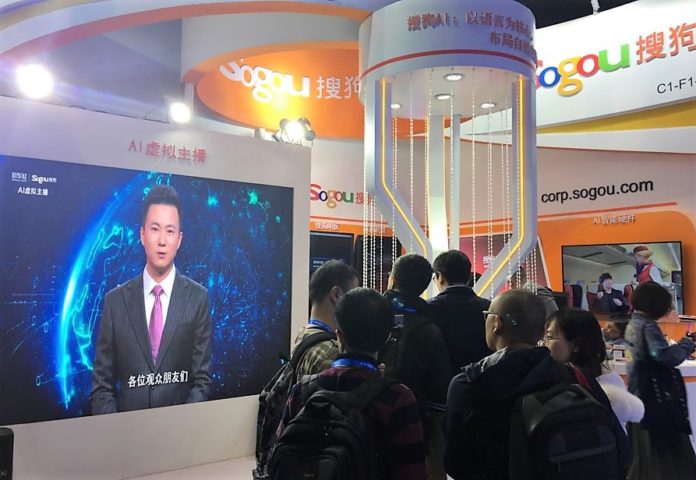World’s first AI news anchor unveiled in China
November 10, 2018 | Expert Insights

China’s state news agency unveiled the world’s first AI anchorman that can read the news in English and Chinese at the World Internet Conference.
Background
Artificial intelligence (AI), is the ability of a digital computer or computer-controlled robot to perform tasks commonly associated with intelligent beings.
Computer systems that had to be programmed to execute rigidly defined tasks can now be given a generalized strategy for learning, enabling them to adapt to new data inputs without being reprogrammed. Advances in data collections and aggregation, algorithms and processing powers have paved the way for computer scientists to achieve significant breakthroughs in artificial intelligence. AI has now moved beyond the lab, with many machine-learning systems already in commercial use for a wide variety of applications. AI adoption is growing rapidly in sectors such as finance, healthcare, and manufacturing.
China has become one of the leading global hubs for AI development, as its capacity for innovation deepens. Recognizing that the nation’s vast population and diverse industry mix can generate huge volumes of data and provide an enormous market, China’s biggest tech companies are making significant R&D investments in AI. The country has laid out a development plan to become the world leader in AI by 2030, aiming to surpass its rivals technologically and build a domestic industry worth almost $150 billion.
Analysis
Xinhua, China’s state news agency and Sogou, a Beijing based search engine debuted a pair of AI news anchors at the fifth World Internet Conference in east China’s Zhejiang Province.
The new AI anchors are digital composites created from the footage of a human host that read the news using synthesised voices. The AI anchors take form and shape of a human being and read out news stories. They have minimal facial expressions and lip movements which look realistic.
At the conference, the Chinese viewers were greeted with a digital version of a regular Xinhua news anchor named Qiu Hao. The anchor, wearing a red tie and pin-striped suit, nods his head in emphasis, blinking and raising his eyebrows slightly. Xinhua also presented an English-speaking AI, based on another presenter. The anchors were developed through machine learning to simulate the voice, facial movements, and gestures of real-life broadcasters, to present an “a lifelike image instead of a cold robot,” according to Xinhua. They fed live broadcasting videos to an algorithm to teach the AI anchor to speak.
AI anchors will report “tirelessly” every day, from anywhere in the country and can read out news without any interruptions. “Not only can I accompany you 24 hours a day, 365 days a year, I can be endlessly copied and present at different scenes to bring you the news,” “I’ll work tirelessly to keep you informed as texts will be typed into my system,” the AI presenter said. The English-speaking AI, based on another presenter, added “The development of the media industry calls for continuous innovation and deep integration with the international advanced technologies … I look forward to bringing you to brand new news experiences.”
Xinhua report said AI anchors have officially become members of Xinhua‘s reporting team and the AI anchors have immeasurable prospects for future news reporting as they could reduce production costs and improve efficiency and accuracy. According to Xinhua, AI technology is not limited to news presenting. The systems can be customised to different clients in other industries. Wang Xiaochuan, the head of Sogou, gave the example of a popular book reading app, Uncle Kai. “In the future, it could be your parents telling the story,” he said. For Xinhua’s already tightly-scripted and controlled state news presenters, the AI anchors take things a step further.
Counterpoint
While China is home to some of the world’s largest tech companies and some 800 million internet users, its internet is one of the most controlled in the world. Observers worry China is turning into a digital police state, with technology from iris and gait recognition being used to monitor activists, ethnic minorities in places like Xinjiang, and regular citizens. “We are an important advocate for peace in cyberspace and a guardian of order.” “China stands ready to safeguard the sound order of cyberspace” said Huang Kunming, head of Communist Party’s propaganda department, speaking at the conference.
Assessment
Our assessment is that AI technologies have far-reaching potential to improve health care, environment, security and education. At the same time, we feel they raise complex ethical, legal and security questions. Digitally manipulated videos that are powered by AI is becoming more accessible in an era that is increasingly filled with fake news, misinformation and propaganda.
AI is run on data as fuel and we believe that China has an advantage because of its large population and availability of data per head. The data that were accumulated previously is coupled with the extensive application market, which has opened an opportunity to apply to AI technologies. For US startups to access the Chinese market, we feel that they have to pay the price with their business data.








Comments